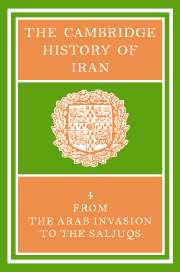Book contents
- Frontmatter
- 1 THE ARAB CONQUEST OF IRAN AND ITS AFTERMATH
- 2 THE ‘ABBĀSID CALIPHATE IN IRAN
- 3 THE ṬĀHIRIDS AND ṢAFFĀRIDS
- 4 The SĀMĀNIDS
- 5 THE EARLY GHAZNAVIDS
- 6 THE MINOR DYNASTIES OF NORTHERN IRAN
- 7 IRAN UNDER THE BŪYIDS
- 8 TRIBES, CITIES AND SOCIAL ORGANIZATION
- 9 THE VISUAL ARTS
- 10 NUMISMATICS
- 11 THE EXACT SCIENCES
- 12 LIFE SCIENCES, ALCHEMY AND MEDICINE
- 13(a) PHILOSOPHY AND COSMOLOGY
- (b) SŪFISM
- 14 THE RELIGIOUS SCIENCES
- 15 SECTS AND HERESIES
- 16 NĀSIR-I KHUSRAU AND IRANIAN ISMĀ‘ĪLĪSM
- 17 ZOROASTRIAN LITERATURE AFTER THE MUSLIM CONQUEST
- 18 ARABIC LITERATURE IN IRAN
- 19 THE RISE OF THE NEW PERSIAN LANGUAGE
- 20 (a) THE “RUBĀ'Ī” IN EARLY PERSIAN LITERATURE
- (b) ‘UMAR KHAYYĀM: ASTRONOMER, MATHEMATICIAN AND POET
- Bibliography
- Index
- Plate section
- Plate section">
- Map 1. Iran under the Abbasids">
- References
13(a) - PHILOSOPHY AND COSMOLOGY
Published online by Cambridge University Press: 28 March 2008
- Frontmatter
- 1 THE ARAB CONQUEST OF IRAN AND ITS AFTERMATH
- 2 THE ‘ABBĀSID CALIPHATE IN IRAN
- 3 THE ṬĀHIRIDS AND ṢAFFĀRIDS
- 4 The SĀMĀNIDS
- 5 THE EARLY GHAZNAVIDS
- 6 THE MINOR DYNASTIES OF NORTHERN IRAN
- 7 IRAN UNDER THE BŪYIDS
- 8 TRIBES, CITIES AND SOCIAL ORGANIZATION
- 9 THE VISUAL ARTS
- 10 NUMISMATICS
- 11 THE EXACT SCIENCES
- 12 LIFE SCIENCES, ALCHEMY AND MEDICINE
- 13(a) PHILOSOPHY AND COSMOLOGY
- (b) SŪFISM
- 14 THE RELIGIOUS SCIENCES
- 15 SECTS AND HERESIES
- 16 NĀSIR-I KHUSRAU AND IRANIAN ISMĀ‘ĪLĪSM
- 17 ZOROASTRIAN LITERATURE AFTER THE MUSLIM CONQUEST
- 18 ARABIC LITERATURE IN IRAN
- 19 THE RISE OF THE NEW PERSIAN LANGUAGE
- 20 (a) THE “RUBĀ'Ī” IN EARLY PERSIAN LITERATURE
- (b) ‘UMAR KHAYYĀM: ASTRONOMER, MATHEMATICIAN AND POET
- Bibliography
- Index
- Plate section
- Plate section">
- Map 1. Iran under the Abbasids">
- References
Summary
To discuss philosophy and cosmology in Persia from the rise of Islam to the Saljuq period is almost synonymous with studying the first phase in the development of Islamic philosophy and cosmology itself. During the first four centuries of Islam the most important intellectual centres wherein such branches of the intellectual sciences (al-‘ulūm al-‘aqliyja) as philosophy were cultivated were either Baghdad, Kūfa and Basra, on the border between Arab and Persian worlds, or the cities of Persia itself, especially those of Khurāsān. During this period only a few centres outside of these areas, such as those of Fātimid Egypt, were of any significance for the development of Islamic philosophy, and even there Persian elements were far from being absent. Therefore, in order not to repeat and summarize in a few pages the genesis and early history of Islamic philosophy in general, we shall seek to concentrate more on the distinctly Persian elements and also on lesser known schools of Islamic philosophy associated with the Persian world. Such important figures as the Arab al-Kindī we shall therefore have to leave aside, although he is in a sense the founder of Islamic philosophy, and the later stages of its development would not be comprehensible without him. Likewise Fārābī, although from Khurāsān, we shall discuss only in passing, for he also has been treated amply in many studies. Of the well-known Peripatetics of the early period, only Ibn Sīnā will be treated more fully, because in addition to the fact that he has played a central rôle in Islamic philosophy in general, the whole later intellectual life of Islamic Persia would be inconceivable without him.
Keywords
- Type
- Chapter
- Information
- The Cambridge History of Iran , pp. 419 - 441Publisher: Cambridge University PressPrint publication year: 1975
References
- 2
- Cited by

